|
|
|
Sort Order |
|
|
|
Items / Page
|
|
|
|
|
|
|
| Srl | Item |
| 1 |
ID:
072895
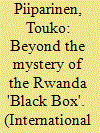

|
|
|
|
|
| Publication |
2006.
|
| Summary/Abstract |
According to the conventional wisdom of the current debate on peacekeeping, the failures of the UN Security Council in general and in Rwanda in particular can be attributed to an absence, not of early warning systems, but of political will on the part of member states. This article argues against the assertion, advanced in much of the existing literature, that political will outweighed early warning in importance. These two factors were interlinked and cannot therefore be compared as if they existed separately. Instead, a more advanced early warning mechanism would have changed the political context so as to facilitate political will to intervene. At a minimal level, such a positive causal relationship would have enabled non-permanent Council members to acknowledge the genocide prior to UNAMIR's (United Nations Assistance Mission for Rwanda) withdrawal and thus to create a political atmosphere of urgency to rescue Rwandans instead of withdrawing troops.
|
|
|
|
|
|
|
|
|
|
|
|
|
|
|
|
| 2 |
ID:
131122
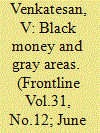

|
|
|
|
|
| Publication |
2014.
|
| Summary/Abstract |
The decision to constitute a special investigation team to investigate cases of black money stashed away in foreign banks will prove to be an acid test for the Narendra Modi government as the fight against the black economy, calls for the strong political will.
|
|
|
|
|
|
|
|
|
|
|
|
|
|
|
|
| 3 |
ID:
097057


|
|
|
| 4 |
ID:
110056


|
|
|
|
|
| Publication |
2011.
|
| Summary/Abstract |
A comparison of the processes of modernization in China and Russia shows that the key factor of its success is the quality of government: it must have a high degree of viability and at the same time be wholly interested in the far-reaching transformation of society. Such interest is generated when the country encounters critical challenges that threaten its existence, and the ruling class recognizes that the country's fate and their own are indivisible. A visible enhancement of the public's well-being is also a necessary condition of the success of reforms.
|
|
|
|
|
|
|
|
|
|
|
|
|
|
|
|
| 5 |
ID:
162417
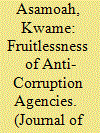

|
|
|
|
|
| Summary/Abstract |
Political corruption has become one of the most topical issues in the political discourse in Ghana. This stems from the fact that corruption has become so endemic and systemic in Ghanaian polity with its negative effects on the economy. Indeed, political corruption negatively affects job creation, investment potentials, infrastructural development and generally the standard of living of the people. It is within this context that anti-corruption institutions have been established in Ghana to address the menace of corruption. The Commission on Human Rights and Administrative Justice (CHRAJ) is one of such institutions established under the 1992 Republican Constitution of Ghana tasked with the responsibility of addressing the problem of corruption in Ghanaian public administration system. This paper examines the extent to which the Commission has achieved this constitutional mandate of addressing the problem of corruption. The study finds that some drawbacks which inhibit the potency of CHRAJ in addressing the problem of corruption include lack of political will by the governing elite to support the institution, eroding confidence of the Commission, the trend of appointing the Head of the Commission in an acting capacity, constitutional weaknesses, poor capacity building support and low motivation. The paper therefore offers pragmatic policy suggestions to address the inherent deficiencies of the Commission with the objective of making it more functional.
|
|
|
|
|
|
|
|
|
|
|
|
|
|
|
|
| 6 |
ID:
141636


|
|
|
|
|
| Summary/Abstract |
Genetically modified crops alone are not enough to assure that smallholder farmers will prosper, but they can help to improve their livelihoods.
|
|
|
|
|
|
|
|
|
|
|
|
|
|
|
|
| 7 |
ID:
142263
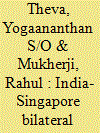

|
|
|
|
|
| Summary/Abstract |
This paper is a critical historical analysis of the trajectory of geo-political and economic relations between India and Singapore. This paper argues that India’s perception of its interests and its geopolitical orientation towards the Cold War prevented India’s security and economic integration with Southeast Asia. Apart from geopolitics, the economic orientation of India was also a critical factor that influenced the trajectory of India – Singapore economic engagement. However, there was a dramatic change after the Cold War ended. The structural change from bi-polarity towards a unipolar moment transformed both geopolitics and economic engagement. Moreover, India’s own economic orientation had also changed by the end of the Cold War. In sum, this paper attempts to elucidate upon how ideas construct economic and political interests and how geopolitical interests, once constructed, drive economic relations.
|
|
|
|
|
|
|
|
|
|
|
|
|
|
|
|
| 8 |
ID:
141334


|
|
|
|
|
| Summary/Abstract |
The first official poverty line for Hong Kong was announced by the new Commission on Poverty during the Poverty Summit on 28 September 2013. However, Leung Chun-ying, the Chief Executive of the Hong Kong Special Administrative Region, stated at the same event that “poverty eradication is impossible.” Based on their misconceptions about poverty, Hong Kong government officials believe that poverty in Hong Kong can only be alleviated but not eradicated. This paper reviews the misconceptions of the government about wealth disparity and poverty, definitions of poverty, and the target of poverty alleviation. Using examples from the United Nations and the United Kingdom, this paper argues that with specific time-bound targets, political will, and the coordinated efforts of society, absolute poverty in Hong Kong can be eradicated, while relative poverty can be reduced as far as possible.
|
|
|
|
|
|
|
|
|
|
|
|
|
|
|
|
| 9 |
ID:
187340


|
|
|
|
|
| Summary/Abstract |
Societies faced with authoritarian rule or conflict usually adopt different paths to peace. The course adopted by each community to guarantee stability determines the extent to which the sustainability of the peace can be assured. Every attempt to pacify a society should aim to prevent a relapse to conflict or authoritarian rule while considering the damage caused and sorting out measures to repair the harm. The history of military coups and conflicts in the Central African Republic (CAR) is well documented. Still, the attempted remedies have greatly side-lined the raison d’être of the responses in guaranteeing peace and preventing relapse to conflict. As the CAR remains politically and socially unstable, an analysis of the failure of peace agreements to ensure stability constitutes a field of inquiry that urgently necessitates a more profound investigation to save the country from recurrent hostilities and guarantee a peaceful society for the citizens. Peace includes an aspiration manifested by both the CAR authorities and non-state armed groups in the course of hostilities and on the negotiation table. Central Africans indicate an interest in peace, but such interest often manifested and materialised in peace agreements has barely been implemented.
|
|
|
|
|
|
|
|
|
|
|
|
|
|
|
|
| 10 |
ID:
093551


|
|
|
|
|
| Publication |
2010.
|
| Summary/Abstract |
Climate change, in particular rainfall variability, affects rain-dependent agriculture in Africa. The resulting food shortages, in combination with rising population and lack of access to electricity needed for development, require the governments and people of Africa to consider renewable energy sources. One example that has high potential in Africa is solar energy. Many African governments have begun discussions about renewable energy but tangible results have yet to materialize. This research contributes to the governmental efforts by presenting the solar electricity potentials for some African cities. Using photovoltaic geographical information system (PVGIS) data, it is clear that there is enough electricity for urban and rural dwellers if there is political will and if the solar panels are mounted at the suggested optimal angles ranging from 8-34°. The solar irradiation at all sites was higher than the typical daily domestic load requirement of 2324 Wh/m2 in urban and rural areas. We provide a strong rationale for political will, collaboration and transparent energy policies that will ensure that life is enhanced through the use of environmentally-friendly renewable energy technologies such as solar power.
|
|
|
|
|
|
|
|
|
|
|
|
|
|
|
|
| 11 |
ID:
149487


|
|
|
|
|
| Summary/Abstract |
Decentralization is a concept well professed by political elites in Ghana yet there has been inadequate political will to transfer actual power, authority and resources to the district assemblies. Ghana’s current decentralization was introduced in 1988 with a mesmeric mantra of ‘power to the people’, and the concept is now over two and half decades old. This paper examines the extent to which local government reform through decentralization has brought about any meaningful changed relationship between central and local governments in Ghana. This work adopts a retrospective analysis of policy documents and a critical stage review of the relevant literature on the theoretical suppositions and practical experience of decentralization practice. The appointment of assembly heads in Ghana makes the relationship a principal-agent typology. Decentralization is at best a theoretical ramification but its actual practice has been just minimal. The study provides a ‘walk-the-talk’ model that requires political will to address the key challenges of decentralization in Ghana.
|
|
|
|
|
|
|
|
|
|
|
|
|
|
|
|
| 12 |
ID:
116443
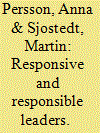

|
|
|
|
|
| Publication |
2012.
|
| Summary/Abstract |
Policy makers and policy-oriented scholars concerned with development and reform commonly appeal to "political will" as a cornerstone of development. We question the circular and voluntaristic view of leadership behavior inherent in such an approach, and argue that-to be more useful for the analysis of development outcomes, as well as for policy design-the discourse on political will should be firmly integrated into a more systematic framework of analysis. In particular, we suggest that it should engage in more active dialogue with the combined insights offered by principal-agent theory and what we refer to as state theory. More specifically, in the framework we develop, the principal-agent framework offers the analytical tools for analyzing leadership behavior at the micro level, while state theory provides crucial insights regarding the macro-level factors shaping leadership behavior. In the end, these two perspectives in tandem have the potential to significantly increase our understanding of empirically observed leadership behavior as well as our theoretical understanding of how the context-and especially the character of underlying social contracts-shapes and constrains "political will."
|
|
|
|
|
|
|
|
|
|
|
|
|
|
|
|
| 13 |
ID:
138859


|
|
|
|
|
| Summary/Abstract |
Conventional wisdom holds that democratic governments listen to their populations, while authoritarian governments do not. This paper questions the extent to which this dynamic applies in cases of government scandals, using the illustrative cases of China and Kenya. We expect democratic countries with free media to be responsive and authoritarian states to ignore public pressure. Counter to this expectation, however, authoritarian China is more responsive to public pressure to clean up scandals than democratic Kenya. Using case studies and quantitative analysis, we argue that while democracy and free media are important for government responsiveness to scandal, they are neither necessary nor sufficient conditions. We assert that political will, state capacity to respond and high public expectations for state action are also necessary.
|
|
|
|
|
|
|
|
|
|
|
|
|
|
|
|
| 14 |
ID:
170256
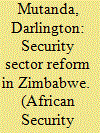

|
|
|
|
|
| Summary/Abstract |
Studies on security sector reform in Zimbabwe have largely taken the radical view that more often than not, the military has acted undemocratically through uttering and overseeing an array of operations meant to stifle democracy. Using document analysis, this article argues that police reform in Zimbabwe is imperative in ensuring the safety of the citizens who have since 1980 fallen victim to police unprofessionalism. There is sufficient evidence to suggest that any insightful discussion on security sector reform in Zimbabwe should take into account the role police have occupied in propping up ZANU PF since independence in 1980. Notwithstanding the volatile political environment that prevailed, it is the argument of this paper that the police were central to the survival of ZANU PF through the systematic execution of violence against the opposition; ignoring cases of political violence brought to them or even the ones they witnessed; carrying out politically-motivated arrests and dismissing alleged anti-ZANU PF police officers. It is therefore significant for Zimbabwe to speed up efforts to train and equip the police force with the requisite skills and weaponry so that they execute their duties within the confines of the country’s constitution.
|
|
|
|
|
|
|
|
|
|
|
|
|
|
|
|
| 15 |
ID:
117183
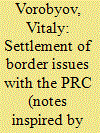

|
|
|
| 16 |
ID:
127746
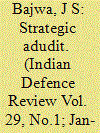

|
|
|
|
|
| Publication |
2014.
|
| Summary/Abstract |
For India to emerge as a regional power and a global player, there is need for an attitudinal change. India has the wherewithal to protect its interests and assert its rights and claims. With political will, the country will forge ahead without encumbrances. The stakes are high and time is running out. India cannot remain static marking time expending energy wastefully while others zoom ahead consolidating and enhancing comprehensive national power. The location of uncommitted reserves up to Corps level and the Strategic Reserve/Mountain Strike Corps opens avenues that need courageous leadership and the will to be exploited to protect and enhance the country's interests.
|
|
|
|
|
|
|
|
|
|
|
|
|
|
|
|
| 17 |
ID:
131125
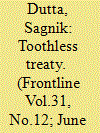

|
|
|
|
|
| Publication |
2014.
|
| Summary/Abstract |
A new OECD declaration paves the way for access to information on bank accounts in tax havens like Switzerland, but is still skewed in favour of such tax havens.
|
|
|
|
|
|
|
|
|
|
|
|
|
|
|
|
| 18 |
ID:
178239


|
|
|
|
|
| Summary/Abstract |
Newfound hope was seen in South Africa on 27 April 1994, when the country held its first democratic elections. In that spirit, South Africa acceded to the 1951 United Nations Refugee Convention and agreed to uphold its promise of protecting the most vulnerable. However, 25 years on, refugees have experienced increased exclusion and rights violations. The last 25 years have brought with them numerous struggles for refugee communities, including violence, institutionalised xenophobia and a lack of political will. How do we get back the momentum and spirit that paved the way for democracy in South Africa? While South Africa has robust legislative measures, a sense of humanity has been lost in their implementation. This article offers an overview of what it means to be a refugee in democratic South Africa, and it asks whether we can trust our democracy to protect the most vulnerable. By exploring the day-to-day obstacles that refugees encounter from the moment they arrive in South Africa, this article aims to highlight the systematic breakdown of the generous laws that are supposed to protect refugees. The law can work, but an ‘injection of humanity’ is needed in public and private life to ensure that the vision of democracy is upheld.
|
|
|
|
|
|
|
|
|
|
|
|
|
|
|
|
| 19 |
ID:
131123
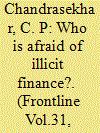

|
|
|
|
|
| Publication |
2014.
|
| Summary/Abstract |
Illicit capital outflow has increased significantly after neoliberal policies were introduced in 1991. Committed as it is to the same economic model, can the NDA government curb generation of black wealth and bring back the black money stashed abroad?
|
|
|
|
|
|
|
|
|
|
|
|
|
|
|
|
| 20 |
ID:
163918
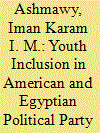

|
|
|
|
|
| Summary/Abstract |
The Arab Spring revealed that when the youth are marginalized, they can resort to informal political movements that may be characterized by extremism and criminality. However, when they join formal groupings, such as political parties, and are well utilized within them, they can become an active political force. This article explores the extent to which American and Egyptian political parties offer opportunities for youth inclusion in their structure and decision-making processes. By conducting semi-structured interviews with young members of the largest two Egyptian parties and the Democratic and Republican parties in the United States, the study argues that when young people develop a long-term interest in politics, they join political parties. Moreover, they are included in the party structures and decision-making processes when they are included in party activities and positions, as well as trusted, heard, and supported within the party. The existence of a national plan and political will may even encourage cross-party youth collaboration.
|
|
|
|
|
|
|
|
|
|
|
|
|
|
|
|
|
|
|
|
|